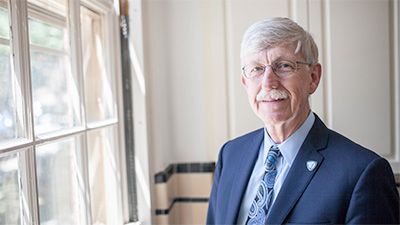Francis Collins on Obama, dealing with Congress, and his one regret

Jeffery DelViscio/STAT
BETHESDA, Md. — At what was supposed to be the end of his tenure atop the National Institutes of Health, Dr. Francis Collins is still a very busy man.
In his seven and a half years leading the agency, Collins has been involved in the response to Ebola and Zika. He has helped secure the first funding increases for the NIH in decades. Congress just this month funneled billions of dollars into several major projects — the Precision Medicine Initiative, the cancer moonshot — that Collins helped craft.
This was supposed to be the finale for Collins. But, as he told STAT in a recent interview in his offices here, he loves the NIH and believes in public service, so if asked he would consider it a “privilege” to remain director under President-elect Donald Trump. Many researchers and members of Congress would like to see him stay. Nobody knows yet if he will.
Below is his full conversation with STAT, in which he reflects on NIH's past and future. The transcript has been lightly edited for clarity and length.
Tell us about a few programs that you are most excited about.
As far as areas of exceptional opportunity, I’d start with the Precision Medicine Initiative. This unprecedented national study of health has recently been renamed and now it is called "All Of Us."
The very bold agenda is to seek a million or more Americans to become our research partners. The new name conveys what we want to say, which is that this is not an academic exercise; this is about all of us. We want our participants to be at the table in every way. They’re partners, they’re not passive subjects. They are intimately engaged in all we’ve done so far and everything we will do. And we expect to launch the recruitment process in the spring.
I’m not saying a specific date right now, because we want to sure that we have everything completely in place, particularly the security systems, which have to be of the highest possible quality.
How will you ensure the security?
The information we’re going to collect from volunteers will include electronic health records, and personal information that the participants answer about themselves. It will include laboratory data — and ultimately complete genome sequences. All of this needs to be treated with great sensitivity if we’re going to honor the relationship we have with our participants to protect their confidentiality. We are building the data system to be state of the art. And, we will be doing a hack-a-thon, probably around February, and just invite a bunch of smart hackers to see if they can break into our system. If so, we’ll ask them, “tell us how you did it,” and we’ll be sure we patch that hole.
Just imagine how transformative this program will be! We had a really interesting session a couple of weeks ago with all of the NIH institute directors, where Eric Dishman [the director of the initiative] laid out what this platform is going to look like for doing research. You’ll have a million people on whom you’ve already collected a lot of data and who are consented for recontact if you wanted to ask them to participate in additional studies.
With a million people you’re going to have 80,000 to 100,000 diabetics, for example, and if you want you can offer to those folks an opportunity to test out some new biomarker for diabetic control or say, “Hey, would you like to be somebody who take part in a clinical trial of an artificial pancreas clinical trial?” This should enable the setting up and implementation of clinical trials at the fraction of the time and a fraction of the cost that it currently requires.
Newt Gingrich is considered a champion of federal research funding, and is close to president-elect Trump. Have you talked to Mr. Gingrich about staying here?
I have had interactions with Newt every few weeks, and that includes since the election. It’s my routine.
Have you been asked to stay?
I have not.
Would you be willing to stay?
The NIH director is appointed by the president. In almost every instance, when there is a change in administration, there is a new NIH director. You have to go back to 1960 to find an exception. So my assumption had always been that come Jan. 20, I would be going back to my lab. There I was planning to have a really excellent time working with postdocs, students, and techs to continue the research on diabetes and aging that I’ve gotten very attached to.
But there has been, as you are no doubt aware, an effort on the part of congressional leaders to propose that it might be reasonable for me to stay on.
Read more at STAT News
- Created on .